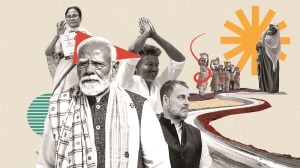Atom aadmi
Why is political class more mature on reforms than on nuke deal? Answer lies in the people

This weekend is the 10th anniversary of India8217;s second nuclear test and, as our columnists have and are pointing out, the irony is big and painful: India8217;s nuclear policy is lost in a political maze just when the country remembers the strategic decision that helped alter India8217;s nuclear profile. There8217;s an even bigger irony: these last 10 years have seen India8217;s overall profile change radically and such an upgrade in status should have been coterminous with policy maturity on such an issue. Think back. In 1998, it would have been insane to predict that 8 per cent growth rate would create despair, because the potential is for 9 per cent-plus. In 1998, it would have been inconceivable that India, along with four other emerging economies, would hold almost a veto power on WTO negotiations. In 1998, who would have predicted that in 10 years news of Indian companies buying up Western blue-chip businesses would almost become blaseacute;? In 1998, America was imposing sanctions against a nuclear-testing India. Today, America and, more important, many in this country, wait in puzzlement for India8217;s politics to understand the value of global acceptance of nuclear exceptionalism.
The puzzlement is stronger when you consider that the same political class, rhetoric and occasional recidivism notwithstanding, has shown maturity on economic policy. The BJP ridiculously opposed VAT but fell in line. The Left has blocked reforms in this government but even Marxists haven8217;t made the market a make or break issue. And the Congress has tried hard to ensure no big backward economic step was taken. So why is the nuclear deal so badly stuck? There are learned explanations that involve clauses and sub-clauses in treaties, and coteries and sub-coteries in parties. But there may be a simpler explanation that involves people.
Parties can8217;t any more substantively sabotage economic reforms without inviting popular disaffection. The nuclear deal is important but is not seen to 8220;touch lives8221; in the same way. That8217;s of course not true 8212; power supply and strategic strength both impact citizens directly. But reforms have been roughly translated into the language of the people. The nuclear deal hasn8217;t been. So parties feel they have the luxury of brinkmanship the Left or cussedness the BJP. Or they the Congress don8217;t feel compelled enough to really test their critics8217; will. Ironically, a crisis can change this; reforms, remember, started because of a crisis. If fuel shortage hits India8217;s nuclear programme badly, a deal that will allow fuel supplies may find a popular idiom. So the key question is whether geopolitics will allow the deal to be done at that time.
- 01
- 02
- 03
- 04
- 05































